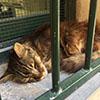Sometimes, I forget
By abby roseNovember 8, 2015 - 19:56

Sometimes, I forget that the people inside are people outside of our classroom. It is eerily easy for me to operate as if our classroom exists in a vaccuum. We enter the prison, head straight to the room, and we don't see the inmates until they're just outside our door. Class goes on every week, just as we planned, and we say goodbye. The people inside go back to... to where? to what? to whom? While back to the van we go, ready to decompress and listen to the latest handful of #1s on the radio. As group we spend so much collective energy planning the class amidst discussions of the prison industrial complex, and thus attempting to address the experiences that the people inside are coming to class with.








